★★★
“Pretty much the first of its kind – with all that implies.”
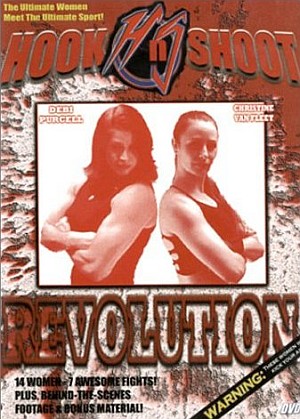 These days, the notion of women participating in mixed martial-arts is no longer seen as particularly outlandish, with names like Tara LaRosa, Yuka Tsuji and Megumi Fujii among the top fighters [as with pro wrestling, the best fighters are out of Japan]. However, this wasn’t always the case: In April 2002, in Evansville, Indiana, one of the first all-women events in America took place. The fights took place under Shooto rules, with two five-minute rounds [though only one fight ended up going into the second]. Here are quick recaps of the seven bouts on the DVD.
These days, the notion of women participating in mixed martial-arts is no longer seen as particularly outlandish, with names like Tara LaRosa, Yuka Tsuji and Megumi Fujii among the top fighters [as with pro wrestling, the best fighters are out of Japan]. However, this wasn’t always the case: In April 2002, in Evansville, Indiana, one of the first all-women events in America took place. The fights took place under Shooto rules, with two five-minute rounds [though only one fight ended up going into the second]. Here are quick recaps of the seven bouts on the DVD.
- Ruth Meija -vs- Erica Montoya Over in 2:32 with an arm-bar, but pretty one-sided. Montoya was in complete control and also landed some hard shots on her opponent.
- Olga Bakalopoulas -vs- Shannon Hooper A better fight, with more well-matched opponents. Hooper wanted to stand and punch, but it was Bakalopoulas who came out on top; she managed to knock her opponent down (albeit more by luck than anything) and applied a keylock submission for victory in a little more than two minutes.
- Jennifer Irons -vs- Jessica Ross A triangle choke submission ended this one at 1:48 in favor of Ross, even though she was giving away a fair amount of weight. Ross is more of a grappler, but got some good blows in, and also showed decent ground skills.
- Tanya Vlahac -vs- Angela Wilson This was a barn-burner, with both women trading hard punches. Vlahac also dropped Wilson with one particular punch, but Wilson used her judo skills to bring her opponent down, and then took control, hitting Vlahac until the referee stopped the fight.
- Shelby Walker -vs- Tara LaRosa LaRosa pounded her opponent into submission, after taking her down. From there on, it was an onslaught of punishment, and I can’t say I’m surprised that LaRosa went on to make a name for herself in the field. Sadly, Walker died, apparently from an overdose of pain medication, in 2006.
- Angela Restad -vs- Mayra Conde Almost all the early offense here was by Conde, with Restad simply trying to survive on the ground. However, as round one wore on, Restad came back, with some solid knees and combinations. The second round continued in a similar way, with Conde having the advantage on the floor, but Restad landing good blows. Conde almost got an arm-bar, but Restad escaped and almost got a choke of her own. This ended in a majority draw – two called it even, one gave it to Restad. A fair result, but the best fight of the night,
- Debi Purcell -vs- Chris Van Fleet Purcell was clearly the better fighter, and had the edge from the start with a powerful punch. However, Purcell also showed good submission skills, and got under the guard of Van Fleet, taking her down for a relatively quick victory, forcing her opponent to tap at 2:42, with a Rear Naked Choke.
Obviously, the scarcity of female mixed martial artists in the US posed something of a problem to the promoters, with the matches apparently made mostly on weight alone. The Restad-Conde match is the only one whose outcome is not certain inside about 30 seconds, and that one is one of the best MMA bouts I’ve seen, male or female. The special features on the DVD include additional interviews with the fighters, who mostly come across as smarter than you might expect, and also Erin Toughill, who was present but not taking part. Two more volumes are available in the series; on the basis of this one, I’d be interested in watching them, but not buying them unseen.





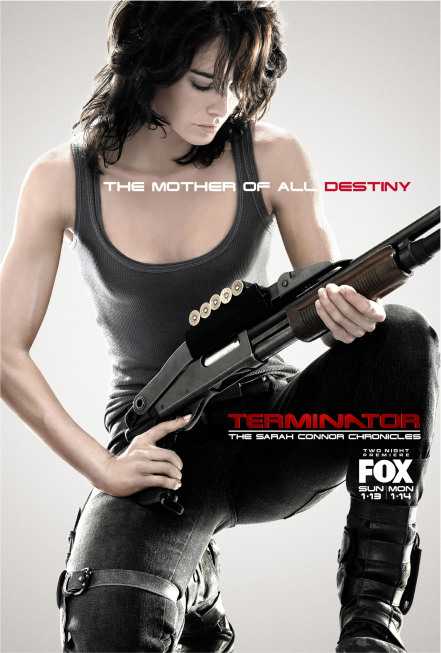 The double-pilot. Probably deserving of a place on the FAQ is, “Why don’t you include Sarah Connor?” The reason is simply that she was a supporting character in the first two Terminator films; one essential to the plot, that’s for sure, but clearly over-shadowed by her male counterparts in both movies. The TV series finally moves Connor (Headey) front and center, and also adds an additional action-heroine dimension, in the shape of Cameron Phillips (Glau), a schoolmate of John Connor’s who turns out to be a new model of Terminator, sent back to watch over him. The show starts in 1999, a couple of years after the events of Terminator 2, but soon shifts to the present day; it thus largely ignores the timeline of Terminator 3, in which Sarah Connor was reported to have died of leukemia in 1997.
The double-pilot. Probably deserving of a place on the FAQ is, “Why don’t you include Sarah Connor?” The reason is simply that she was a supporting character in the first two Terminator films; one essential to the plot, that’s for sure, but clearly over-shadowed by her male counterparts in both movies. The TV series finally moves Connor (Headey) front and center, and also adds an additional action-heroine dimension, in the shape of Cameron Phillips (Glau), a schoolmate of John Connor’s who turns out to be a new model of Terminator, sent back to watch over him. The show starts in 1999, a couple of years after the events of Terminator 2, but soon shifts to the present day; it thus largely ignores the timeline of Terminator 3, in which Sarah Connor was reported to have died of leukemia in 1997. The rest of the series If there’s an unfinished feel to the show, that would be because it was. Thanks to the writer’s strike, the final four episodes never made it to the screen, and the storylines will be incorporated into the upcoming second series, confirmed by Fox in April. While not perhaps the makers’ fault, it undeniably had an effect, basically leaving us to turn to each other at the end [which involved a car-bomb] and go, “Is that it?” The rest of the series, however, wasn’t so terrible, though it did feel somewhat stretched. The main plot threads were extensions of the pilot: a) the Connors trying to stop Skynet from becoming active, in particular through locating a chess computer called The Turk, and b) evil Terminator Cromartie trying to stop them. There’s also c) an FBI agent (Jones) who is trying to piece together the pieces, trailing both parties, and d) the arrival of Derek Reese, the brother of Kyle and therefore John Connor’s uncle.
The rest of the series If there’s an unfinished feel to the show, that would be because it was. Thanks to the writer’s strike, the final four episodes never made it to the screen, and the storylines will be incorporated into the upcoming second series, confirmed by Fox in April. While not perhaps the makers’ fault, it undeniably had an effect, basically leaving us to turn to each other at the end [which involved a car-bomb] and go, “Is that it?” The rest of the series, however, wasn’t so terrible, though it did feel somewhat stretched. The main plot threads were extensions of the pilot: a) the Connors trying to stop Skynet from becoming active, in particular through locating a chess computer called The Turk, and b) evil Terminator Cromartie trying to stop them. There’s also c) an FBI agent (Jones) who is trying to piece together the pieces, trailing both parties, and d) the arrival of Derek Reese, the brother of Kyle and therefore John Connor’s uncle.
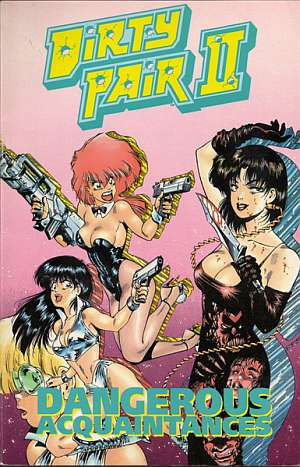 It’s been at least a decade since I read this – probably more – but it is still a thoroughly-enjoyable read, and a major improvement in just about every way (plotting, art, pacing, imagination and characterization) over the first stab. Of particular note is the solid way in which the two separate threads of the story are woven together. While on holiday, Kei and Yuri bump into Shasti, a former colleague of theirs in the WWWA. She was actually an android, who went rogue after a criminal’s personality was implanted into her, part of a (failed) experiment to see if it would help with his capture to have her think like him. She’s now apparently leading a group of “freedom fighters” who are planning to hijack a luxurious space-liner, crammed with VIPs and new technology. Has Shasti gone all political? Or, if not, what is she up to?
It’s been at least a decade since I read this – probably more – but it is still a thoroughly-enjoyable read, and a major improvement in just about every way (plotting, art, pacing, imagination and characterization) over the first stab. Of particular note is the solid way in which the two separate threads of the story are woven together. While on holiday, Kei and Yuri bump into Shasti, a former colleague of theirs in the WWWA. She was actually an android, who went rogue after a criminal’s personality was implanted into her, part of a (failed) experiment to see if it would help with his capture to have her think like him. She’s now apparently leading a group of “freedom fighters” who are planning to hijack a luxurious space-liner, crammed with VIPs and new technology. Has Shasti gone all political? Or, if not, what is she up to?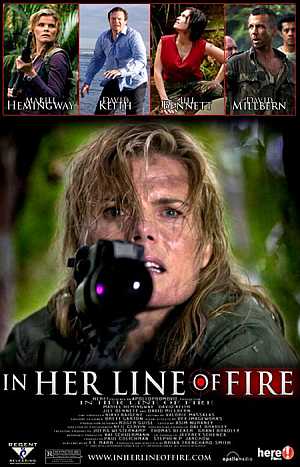 This is a competently-made but ultimately forgettable film – it feels very much like a TVM, albeit for one of the slightly-more liberal channels. Hemingway plays Secret Service agent Lynn Delaney, who has to look after the Vice-President, when their place crashes in the Pacific. Of course, in the way things only happen in Hollywood movies, the island to which the struggle is a rebel outpost, and the VP is a former soldier, with more-than adequate combat skills of his own. Which extend to more than shooting people in the face, Dick Cheney please note. Meanwhile, there’s a lot of tension with female journalist Sharon Serrano (Bennett), who is also among the survivors; this includes tension of a sexual kind, if you know what I mean, and I think you do. Like I said: one of the slightly-more liberal channels. However, it’s nice that no big thing is made of this; you’re not whacked over the head with anyone’s sexual orientiation, as in D.E.B.S. [Curiously, even the nods in this direction are edited out from some releases]
This is a competently-made but ultimately forgettable film – it feels very much like a TVM, albeit for one of the slightly-more liberal channels. Hemingway plays Secret Service agent Lynn Delaney, who has to look after the Vice-President, when their place crashes in the Pacific. Of course, in the way things only happen in Hollywood movies, the island to which the struggle is a rebel outpost, and the VP is a former soldier, with more-than adequate combat skills of his own. Which extend to more than shooting people in the face, Dick Cheney please note. Meanwhile, there’s a lot of tension with female journalist Sharon Serrano (Bennett), who is also among the survivors; this includes tension of a sexual kind, if you know what I mean, and I think you do. Like I said: one of the slightly-more liberal channels. However, it’s nice that no big thing is made of this; you’re not whacked over the head with anyone’s sexual orientiation, as in D.E.B.S. [Curiously, even the nods in this direction are edited out from some releases]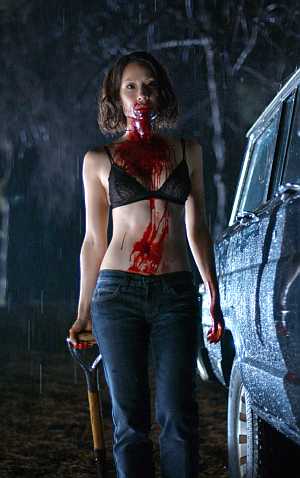 The main obstacle to this even reaching average is probably a first-half structure that is, for no readily apparent season, entirely fractured. Scenes appear entirely out of order, with no explanation: why is our heroine now waking up in a morgue? And the problem is, what the film has to offer is so pedestrian, you can’t be bothered to start putting the pieces together. Liu plays Sadie Blake, a journalist investigating the shady underground side of goth culture, who ends up finding a clan of vampires are on top of the food chain, just before becoming one of their victims. However, instead of taking her undeath lying down, she vows revenge and, accompanied by a rogue cop (Chiklis, you’ll not be surprised to learn), begins working her way up said food-chain.
The main obstacle to this even reaching average is probably a first-half structure that is, for no readily apparent season, entirely fractured. Scenes appear entirely out of order, with no explanation: why is our heroine now waking up in a morgue? And the problem is, what the film has to offer is so pedestrian, you can’t be bothered to start putting the pieces together. Liu plays Sadie Blake, a journalist investigating the shady underground side of goth culture, who ends up finding a clan of vampires are on top of the food chain, just before becoming one of their victims. However, instead of taking her undeath lying down, she vows revenge and, accompanied by a rogue cop (Chiklis, you’ll not be surprised to learn), begins working her way up said food-chain.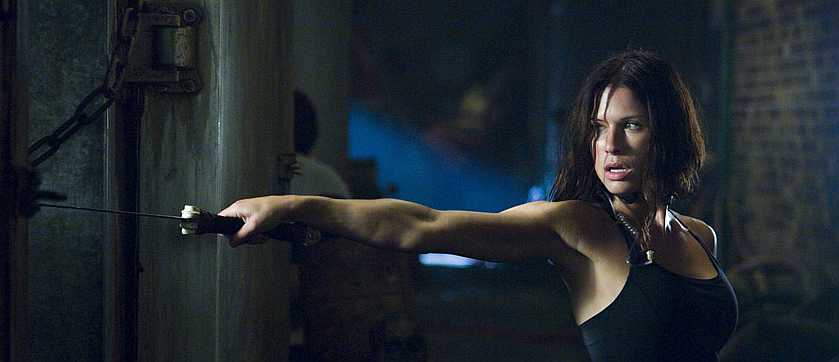 ★★★½
★★★½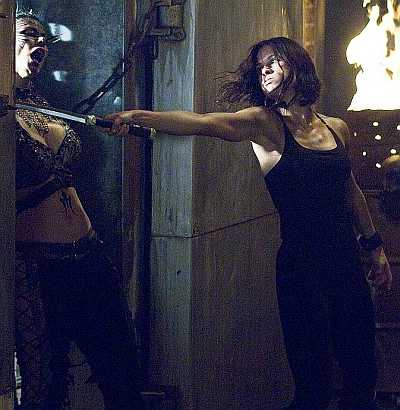 In the near future (next week, actually at the time of going to press), Glasgow falls prey to the Reaper virus, which is exactly what it sounds like. The government in London deal with the problem by building a 30-foot wall along the border and sealing off Scotland – which is basically the approach taken by the government to problems in Scotland since, oh, about 1707. [Hello, born there!] 30 years later, however, the virus breaks out in London, and all of a sudden, the information that people are still alive in Scotland, suggesting they found a cure, is now of more than academic interest. To get the cure, they send Eden (Mitra) up North, to find Kane (McDowell, appearing in about two scenes, then taking his salary and leaving), who might just have the solution. However, things do not go as planned, needless to say, not least because Glasgow is inhabited by nothing but psychopathic thugs with poor dress sense and bad skin, stuck in the past. So, no change, then. [Hello,
In the near future (next week, actually at the time of going to press), Glasgow falls prey to the Reaper virus, which is exactly what it sounds like. The government in London deal with the problem by building a 30-foot wall along the border and sealing off Scotland – which is basically the approach taken by the government to problems in Scotland since, oh, about 1707. [Hello, born there!] 30 years later, however, the virus breaks out in London, and all of a sudden, the information that people are still alive in Scotland, suggesting they found a cure, is now of more than academic interest. To get the cure, they send Eden (Mitra) up North, to find Kane (McDowell, appearing in about two scenes, then taking his salary and leaving), who might just have the solution. However, things do not go as planned, needless to say, not least because Glasgow is inhabited by nothing but psychopathic thugs with poor dress sense and bad skin, stuck in the past. So, no change, then. [Hello, 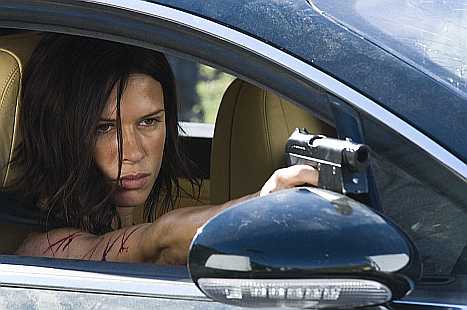 It all builds to a monumental car-chase, though you have to suspend disbelief there, as apparently Bentley cars will start right out of the crate, even if they’ve been sitting there for thirty years. You can also plough them through an exploding bus, amongst a litany of other torments, and they’ll come out the other side with barely a scratch. Again, if you’re going to ground your film in the ‘real world’, admittedly a questionable concept given the plot synopsis above (and I haven’t even got to the more outrageous elements yet!), then mis-steps such as these should be avoided. They’ll just give the more moronic end of the critical fraternity – paging Jeff Otto – blunt objects with which to whack your film about the head, as they ride off on their high horse. They only bothered me slightly, since I was already in full-on disbelief suspension, and since the resulting car-chase was cheerfully destructive, I’m inclined to give it some slack.
It all builds to a monumental car-chase, though you have to suspend disbelief there, as apparently Bentley cars will start right out of the crate, even if they’ve been sitting there for thirty years. You can also plough them through an exploding bus, amongst a litany of other torments, and they’ll come out the other side with barely a scratch. Again, if you’re going to ground your film in the ‘real world’, admittedly a questionable concept given the plot synopsis above (and I haven’t even got to the more outrageous elements yet!), then mis-steps such as these should be avoided. They’ll just give the more moronic end of the critical fraternity – paging Jeff Otto – blunt objects with which to whack your film about the head, as they ride off on their high horse. They only bothered me slightly, since I was already in full-on disbelief suspension, and since the resulting car-chase was cheerfully destructive, I’m inclined to give it some slack. “Like The Prophecy, made for 75 cents and without Christopher Walken.”
“Like The Prophecy, made for 75 cents and without Christopher Walken.”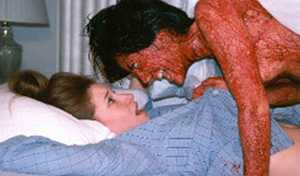 Things build to a final showdown in a warehouse, where the makers finally locate their supply of fake blood, which has been largely notable by its absence for the first hour, and it is quite effective. I do wonder why the angels, on both sides, don’t make better uses of their powers, though must also say, said powers are also somewhat crap: if I was responsible for holding the balance between good and evil, I’d want something better than the ability to turn into a fat guy. Overall, one would quite like to see this remade as a big-budget work, because the ideas here are good; with a good effects studio – and significantly better fight choreography – this has a lot of potential. However, Hollywood appears too busy remaking mostly-mediocre Asian horror to notice. We are therefore stuck with a cheap version, whose flaws likely distract too much from its merits for this to find a wide audience.
Things build to a final showdown in a warehouse, where the makers finally locate their supply of fake blood, which has been largely notable by its absence for the first hour, and it is quite effective. I do wonder why the angels, on both sides, don’t make better uses of their powers, though must also say, said powers are also somewhat crap: if I was responsible for holding the balance between good and evil, I’d want something better than the ability to turn into a fat guy. Overall, one would quite like to see this remade as a big-budget work, because the ideas here are good; with a good effects studio – and significantly better fight choreography – this has a lot of potential. However, Hollywood appears too busy remaking mostly-mediocre Asian horror to notice. We are therefore stuck with a cheap version, whose flaws likely distract too much from its merits for this to find a wide audience. Let me be perfectly clear: one of the above stars is purely for entertainment value, since this is one of those movies which is so bad as to become enjoyable, purely on that level. There is hardly an aspect of this film which is not badly-executed: the script is badly thought-out, the performances are almost without exception woeful, and the continuity has to be among the worst of all time. One actress goes from a colored top and no bra, to a bra, to a white top and no bra, in successive scenes, while another enters a pool in a bikini, comes out topless, and five second later has the top back on and is dry. We laughed like drains, I tell you. Oh, you want the plot? Mousy scientist Helen (Kitchen) is trying to find a brain chemical that will unleash humanity’s psychic powers, using imprisoned serial-killer Horn (Marks) as her source. Even though the resulting chemical is green and glowing, in a way not seen since Re-Animator, she decides to test it on herself. This unleashes her alter-ego, Cassandra, who embarks on a plot to enslave mankind to her will. It’s up to her assistant Gary (Klitzner), along with a homicide detective (Rivers) to stop her.
Let me be perfectly clear: one of the above stars is purely for entertainment value, since this is one of those movies which is so bad as to become enjoyable, purely on that level. There is hardly an aspect of this film which is not badly-executed: the script is badly thought-out, the performances are almost without exception woeful, and the continuity has to be among the worst of all time. One actress goes from a colored top and no bra, to a bra, to a white top and no bra, in successive scenes, while another enters a pool in a bikini, comes out topless, and five second later has the top back on and is dry. We laughed like drains, I tell you. Oh, you want the plot? Mousy scientist Helen (Kitchen) is trying to find a brain chemical that will unleash humanity’s psychic powers, using imprisoned serial-killer Horn (Marks) as her source. Even though the resulting chemical is green and glowing, in a way not seen since Re-Animator, she decides to test it on herself. This unleashes her alter-ego, Cassandra, who embarks on a plot to enslave mankind to her will. It’s up to her assistant Gary (Klitzner), along with a homicide detective (Rivers) to stop her.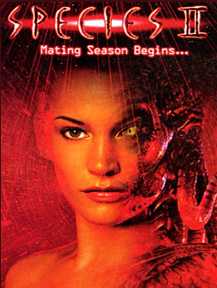
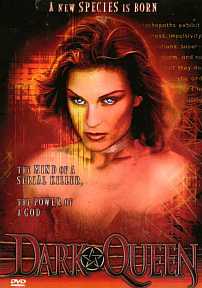 It should be entirely clear which series the distributors of Dark Queen are hoping you’ll mistake their film for an entry in. In reality, this is not fit to lick Natasha Henstridge’s boots; it’s really much closer to Dr. Jekyll and Sister Hyde, yet as such, is still a dismal failure – that whirring sound you hear is Robert Louis Stevenson spinning in his grave. However, even as it fails on just about every cinematic level, fans of bad cinema may find this has its merits. However, even there, it may still divide opinions: I had rather more fun with this than Chris [she, on the other hand, liked the midget-vampire movie, Ankle Biters, which I found almost unwatchable]. You can certainly sense where they were aiming with this; however, the execution is, frankly, so awful as to drain any potential from it, almost entirely.
It should be entirely clear which series the distributors of Dark Queen are hoping you’ll mistake their film for an entry in. In reality, this is not fit to lick Natasha Henstridge’s boots; it’s really much closer to Dr. Jekyll and Sister Hyde, yet as such, is still a dismal failure – that whirring sound you hear is Robert Louis Stevenson spinning in his grave. However, even as it fails on just about every cinematic level, fans of bad cinema may find this has its merits. However, even there, it may still divide opinions: I had rather more fun with this than Chris [she, on the other hand, liked the midget-vampire movie, Ankle Biters, which I found almost unwatchable]. You can certainly sense where they were aiming with this; however, the execution is, frankly, so awful as to drain any potential from it, almost entirely.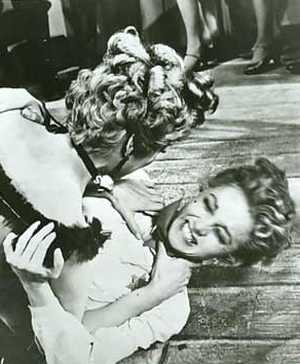 While Corman is better known now as a producer of schlock-horror, he has tried his hand at just about every genre in his time. This was his last stab at the Western, with Garland playing Rose Hood, who takes over as the marshal of Oracle, after her husband is gunned down. However, she incurs the wrath of local saloon-owner Erica Page (Hayes, best known for the title role in Attack of the 50 Ft. Woman), who is running a property-acquisition scheme, based on her hopes for the railroad to come to town. She brings hired killer Cane Miro (Ireland) up from Tombstone, only for him to fall for his intended victim, who is unaware of his mission. Which is surprising, since he is dressed from head to toe in black – even at age seven, when I used to watch The Virginian with my father, I knew this indicated an utterly irredeemable nature.
While Corman is better known now as a producer of schlock-horror, he has tried his hand at just about every genre in his time. This was his last stab at the Western, with Garland playing Rose Hood, who takes over as the marshal of Oracle, after her husband is gunned down. However, she incurs the wrath of local saloon-owner Erica Page (Hayes, best known for the title role in Attack of the 50 Ft. Woman), who is running a property-acquisition scheme, based on her hopes for the railroad to come to town. She brings hired killer Cane Miro (Ireland) up from Tombstone, only for him to fall for his intended victim, who is unaware of his mission. Which is surprising, since he is dressed from head to toe in black – even at age seven, when I used to watch The Virginian with my father, I knew this indicated an utterly irredeemable nature.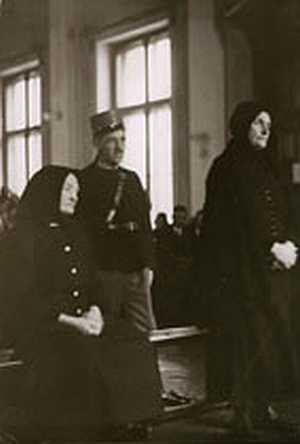 You wouldn’t know it to look at the sleepy Hungarian village of Nagyrév [population: 872], but there was a time between the world wars when this was the murder capital of the world. Between 1914 and 1929, an estimated
You wouldn’t know it to look at the sleepy Hungarian village of Nagyrév [population: 872], but there was a time between the world wars when this was the murder capital of the world. Between 1914 and 1929, an estimated